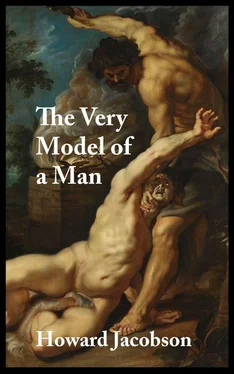Had the Architect of our emotions thought to come down and whisper in my ear, ‘Let us together, you and I, give something to that lovely boy, Abel; let us confer, we who want nothing, as to what that gift should be,’ all could have been saved. I would gladly have joined Him in His deliberations. Urged Him on to wilder and wilder extravagance. Give my brother everything, I would have said. Roll up fields for him like carpets. Gather him forests like bouquets. Keep not a stone from him. Keep not a worm. And my heart would have burst with love then, as it bursts now, imagining my munificence.
This, though, I will grant you:
I was not hanging hour after hour in an inimical tree, watching, weightless, my mother presenting her profile to one voracious lover and her nipple to another, because I was made to. Nobody forced me; I had alternatives.
The mountain, for example, was still amenable to unspoken sociability even if my father was not. And I did miss the mountain for the cold comfort its rocks gave me when I could bear fecundity no longer. There were more naming expeditions to go on, rare root and tuber hunts of my own devising — for truffles, yams, rhizomata, artichokes (by which I mean the fibres of the sun-loving turnsole, not the thirsty audi shauki which you in Babel use to spoon up oil and vinegar, the same way you slop up stories). There were rivers to navigate, unentitled rills and runnels to follow into whatever caverns of the earth they emptied. I could have been gone half a year — longer — before anyone noticed I was missing, and in that time have become a mighty hunter, a wayfarer of genius, a surveyor of the soul and spirit with his sights set on himself. Oceans might have borne my name, the lavic slopes of volcanoes the impression of my sandals. Who knows? — it is not beyond the bounds of credibility that an avenue of this very city might have celebrated me — CAINSWAY — and been tramped on in my honour for perpetuity…
Had I only leapt, swung and leapt, light as a boy, from those hypnotic branches.
But there was never a chance of that. Never. The tree held me enthralled, as rooted as itself. It was from the tree that I could view without distraction the drama of my existlessness made flesh, and no salt-water voyage, no truffle hunt or pilgrimage to find and pocket the last opalescent bead of the river Pison, was as interesting a pastime to me as that. Once you have seen yourself not there you cannot cease from looking.
The sub-plot also — mere illustrative stage-business as it was — had begun to engross me. I sensed a crisis, heaven huddling into conference, a reappraisal of tactics, a decision, by no means lightly taken, to underprop the shekinah with something more tactile. To bolster it up. To flesh it out. It was becoming apparent that my mother’s attention could not always be held by streaked skies and throbbing dawns. Pink gave way to silver. Blue to white. Sometimes, in a sort of inspired desperation, God the Painter would let go a great puff of flaming breath and seem to canopy her with the ribbed sands of the shore itself. But the likelihood that she was watching was diminishing. She lacked celestial patience. The chip of Adam’s bone from which she had been taken still determined her disposition; she was brittle, obstinate, unadaptable, impervious; she was not content passively to expend aeons marvelling at light. If He was to keep her thoughts raised from the earth and fixed perpetually on Him, the Creator of Everything That Is Garish had to come up with fruitier, meatier inducements. He had to compete, in other words, with His own Adam.
Descending in Person remained out of the question. Pride kept Him invisible. A conviction that things would have come to a pretty pass indeed the day our reverence for Him became contingent on His possessing a body. As if we had the right to insist that our Maker be fashioned in the likeness of ourselves. Such a scruple did not preclude, however, as it had not precluded in the past, the employment of mediators, giant go-betweens that partook of His divinity but were, in appearance anyway, prepared to meet us halfway.
One of them, moved by my father’s fervent prayers, had dropped to earth, my mother said, to soothe her while she cried giving birth — she who had never given birth before, and never been born herself — to me. He had stroked her face, her shoulder, touched her breast, seeming to console her even against the white-hot indifference (that time) of the Master he served.
A diaphanous man stood by you, she told me, at the moment you came into the world.
I had no memory of him, but it troubled me that he had stroked her face, her shoulder, touched her breast.
Had my mother changed the verbs, I wondered, after the wonderful event.
Another diaphanous man, of whom I also had no memory, breathed day and night upon the flames that licked up from his sword, barring us for eternity, so I was told, from a place that my parents, frankly, found too abstract and conceptual, sown with too many exclusions and symbolic interdictions, ever to miss.
Nephilim. Angels. God’s single compromise between matter and non-matter. And just the beings to entrust with the delicate task of turning Eve’s turning thoughts away again from things sublunary.
‘Go to her,’ I imagine He must have instructed them, ‘go to her and brush her lightly with your wings so that her skin may have knowledge of the feather touch of heaven. But in your hearts let love unlibidinous reign.’
I am certain in my own mind that He had always known it was a poor idea to breach hierarchical etiquette, that nothing good would ever come of commerce between the sons of God and the daughters of men. But He too was a compulsive spectator, He too hung in a poison tree, and narrative curiosity must have got the better of Him; morbid narrative curiosity — an inclination to see how it would turn out precisely because it was bound to turn out badly.
This may look to you, who have lived for some time now without a Single God to trouble your equilibrium, like wanton cruelty on His part, the idle malice of a well-fed cat toying with whatever squeaks. In fact He meant harm primarily to Himself. Like all creative forces He was bent on apocalypse and ruin — the grand destruction of His grand design. The Lord giveth and the Lord taketh away? No, no — He is not so whimsical. The Lord giveth in order that the Lord may take away.
A thousand times a thousand years before He made the world He must have itched to flood it. Destruction was such a powerful impulse in Him it is a miracle — perhaps the miracle of all miracles — that He was ever able to stay His hand long enough to fashion something to destroy. And God looked upon the earth, and, behold, it was corrupt. Behold! Did I not know it! Did I not tell thee!
Ah, the bliss of it! Vindication! Ah, the joy of it!
And this His own handiwork. Was there ever artist who hated his own artistry so feverishly? Or lover so intent on proving himself betrayed?
A thousand times a thousand years before He made the world He itched to flood it, burn whatever in it was flammable, flatten whatever in it was round. And there is no reason not to believe that He laid plans as far back as then to drop the angels Azael and Semyaza before my mother on a day so hot it was necessary to close one’s eyes against the unendurable harshness of colour, on a day so moist it seemed as though rain had forgotten gravity and was falling upwards, from earth to heaven.
They landed soundlessly, showing every consideration for her afflicted senses, fanning the air about her cool with their pinions, their breath winnowing her hair, a soft soothing tinkling, flatter than the sound of ice-cold water playing over stones, more like wind rattling a banana plant, coming from the jewellery Azael wore — it seemed to me defiantly, as a reproach — around his wrist and throat.
Читать дальше











